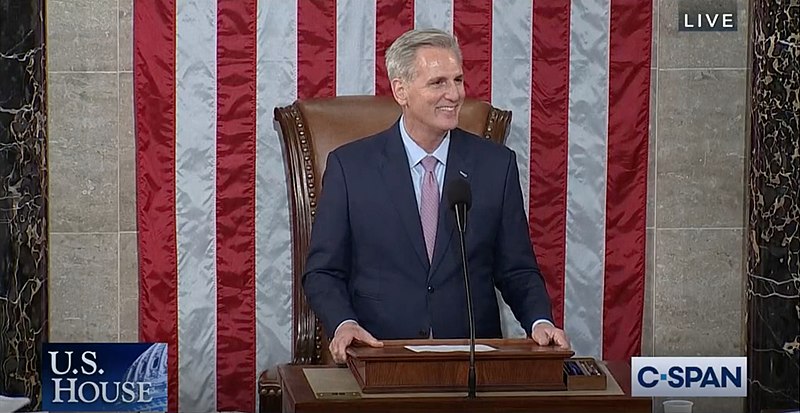- 14 3402-5578
- Rua Hygino Muzy Filho, 737, MARÍLIA - SP
- contato@latinoobservatory.org
 Fonte: https://www.c-span.org/video/?525203-9/kevin-mccarthy-elected-speaker-15-ballots
Fonte: https://www.c-span.org/video/?525203-9/kevin-mccarthy-elected-speaker-15-ballots
In the midterm elections of November 2022, despite projections pointing to a crushing victory for Republicans, the results showed the resilience of the Biden administration and the Democratic Party. The so-called "red wave" (alluding to the color of the Republican Party) did not occur. Democrats maintained control of the Senate and the Republican majority was only 7 votes above the minimum required to control the House of Representatives. Given the divisions within the Republican Party, the choice of the House of Representatives (Speaker) president was quite tumultuous, leaving the new leader in a very precarious position and at the mercy of radical groups, as we will discuss below.
On January 7, 2023, Kevin McCarthy (CA), then the leader of the Republican majority in the United States House of Representatives, was elected as the new president of the House of Representatives (Speaker), succeeding Nancy Pelosi. After a period of uncertainty and internal dispute within the Republican Party, McCarthy managed to obtain a majority of the votes. He was not elected by more than half of the votes in the House, but because six members of his own party abstained. McCarthy was elected with 216 in favor and 212 in favor of Democrat Hakeem Jeffries (NY), becoming the leader of the House.
McCarthy faced difficulties in obtaining the necessary votes to be elected due to a division within the Republican Party itself. Despite the support of the majority of the Republican Party, some congressmen from the ultra-conservative wing of the party opposed his name, arguing that he was not a strong enough leader and doubted how effectively conservative his ideas were. In addition, they demanded the adoption of parliamentary changes to reduce the power of the House president, further restrict public spending, and have McCarthy be tougher on progressive segments of the Democratic Party. In general, the group is made up of newly elected congressmen who believe in conspiracy theories, are extremely religious and skeptical about the legality of Joe Biden's 2020 election.
The climax of the discord between different wings of the Republican party and McCarthy's embarrassment was after the abstention of Congressman Matt Gaetz, a Republican from Florida, during the vote for the Speaker, which brought out the outbreak of Mike Rogers, also a Republican Congressman from Alabama. After a few seconds of hostility exchange between the two, deputy Rogers was physically removed from the situation.
To get the necessary votes, McCarthy agreed to reduce the number of Congress members needed to initiate a motion to vacate the speaker's chair to one. Thus, only one member can try to force him to leave office, and a simple majority in voting is necessary for McCarthy to leave office. In this way, in theory, a small group of ultra-conservative Republicans can work together with democrats to remove the newly elected Speaker if they are not satisfied with his actions or decisions. After his confirmation in the office, McCarthy wrote on his Twitter: " I hope one thing is clear after this week: I will never give up. And I will never give up for you, the American people."
These factors made it difficult for McCarthy to obtain the necessary support to be nominated as Speaker. It took 15 rounds of voting for the new president to be elected, the longest period of deadlock since before the beginning of the Civil War in the mid-19th century. Throughout the unsuccessful voting days, he made concessions to the extreme right wing to secure the position. Now, as the leader of Congress, he has less autonomy and power.
It should be noted that the function of Speaker of the House is equivalent to that of the President of the House of Representatives in Brazil. This means that Kevin McCarthy becomes the second in line for the presidential succession, behind Vice President Kamala Harris. He is responsible for supervising and presiding over Congress sessions, including administration of votes, and recognizing members who wish to speak and ensuring that measures proposed by the ruling party are discussed and voted on. He is also responsible for appointing members to congressional committees and has extensive influence over their rules and procedures. Despite the controversy, his election also represents the end of Joe Biden's control over the two houses of the American Congress.
McCarthy and the governance of the United States in the next two years.
Given the election of McCarthy and the current political configuration of the legislative chamber, it is possible to discuss forecasts in some central topics for North American politics, society, and economy.
The ethnic issue is central in American politics, as the United States is a country of immigrants from all over the world, especially from Latin American countries. Therefore, it is important to evaluate the current situation of the lower house of the United States. Starting with McCarthy's position, who has previously supported former President Trump and ratified the construction of the wall between The US and Mexico. The position of saying that the United States is a country of immigrants, but at the same time legitimizing a massive and harsh immigration control bureaucracy steeped in underlying xenophobia seems to continue a trend among Republican congressmen, including the newest speaker, who guaranteed that no amnesty project would reach the House floor, referring to immigration amnesty for the 11 million illegal immigrants in The US, proposed by President Biden.
Moreover, still from an ethnic perspective, the racial issue is important for American politics, as the country has racism as a disease present in all layers of its structures. Republicans, the majority in Congress and the party of which Speaker McCarthy is a member, shows some unity regarding racial issues, as they believe that there is no need to do more to combat racial inequality. Most of these groups also believe that the government intervenes in issues that should be the responsibility of individuals and companies, and that white people do not shy away from their race within the United States. Nevertheless, the current American legislative has 133 senators and members of congress who identify as black, Hispanic, Asian, or native American, according to the Pew Research Center. The number has almost doubled since the 108th congress, from 2003 to 2005, which had 67 memberswith such identifications.
The American hegemony is also a recurring topic for American politics and has been, especially Republican after the Trump administration, directed towards China and the Chinese Communist Party. In assembly, the newly formed Congress created a new select committee to investigate the long-term threat of China to the United States. It received more votes than any other measure this week, as all Republicans present, and 146 Democrats voted in favor of it. The Committee will have the function of exposing the Chinese Communist Party's strategy to mitigate American sovereignty. This demonstrates a trend that the congress will follow under McCarthy's leadership.
The recent Republican majority in the House of Representatives has put the issue of abortion at the top of their political agenda. Two measures related to the subject have been passed by party vote. The first is a bill that requires health professionals to try to save the lives of babies born alive during or after an abortion. The second measure is a resolution condemning the "recent attacks on pro-life facilities, groups, and churches." Although the resolution does not have to be approved by the Senate, the other bill, called the "Born-Alive Abortion Survivors Protection Act," is unlikely to be approved by the Senate or signed by President Joe Biden. It is worth noting that these actions in the House of Representatives come after the Supreme Court's decision in June 2022 to repeal the right to abortion, established in the historic 1973 decision Roe v. Wade. The repeal played a significant role in mobilizing Democratic voters and candidates, which may have contributed to preventing a larger Republican majority.
Finally, it is important to mention the blocking capacity that the new Republican majority can exert on the federal budget. Republicans have an agenda related to tax cuts for the wealthiest segments of the population, arguing that more available income for the rich can result in new business opportunities and, therefore, more job creation. In this vein, they also defend cuts to social programs, particularly those that serve low-income populations, such as subsidies for medical assistance, subsidies for the poorest families, and spending on public education. On the other hand, they are strong supporters of military spending, particularly at a time when the country is facing the challenges of the War in Ukraine and considers China a threat to its hegemony.
The budgetary problem takes on new dimensions when the federal government reaches the debt ceiling on January 19, 2023, projected at $31.4 trillion. Upon reaching the limit, the activities of the US government can be compromised, even defaulting on suppliers, employees, operating the public machinery, and creditors of the debt. In the face of this possibility, the Republican majority is blackmailing the Biden government to cut social spending and also the infrastructure investment package under the Build Back Better initiative. There have been other impasses between a Republican Congress and the Democratic Executive power. In 2011, the Barack Obama government faced a long crisis with Congress to find a solution to the debt crisis. The impasse was resolved by increasing the spending ceiling and promising to cut expenses for a 10-year period. It is interesting to note that eleven years ago, the country's public debt was approximately $15 trillion. Today, the limit is more than double!
Although the Republican majority in the House of Representatives may try to create constraints for the Joe Biden administration, a racial approach may compromise the Republicans' own prestige, as the stoppage of federal government activities with the population and the threat of defaulting on debt securities may increase the public’s and investors’ mistrust of the political system, In the 2011 crisis, the United States debt securities lost the highest rating from risk assessment agencies. The "AAA" title fell to "AA+", causing significant harm to the dollar's dominant position in the international financial system.
Observing the radicalism of a significant portion of the new congressmen, it is not unlikely that the negotiation rope will stretch to the point of breaking. The biased view of the ultra-conservative wing of the Republican Party may bring harm to the country beyond what the elite considers reasonable. Unfortunately, the most ideologized portion of the party does not like History and relies on conspiracy theories, which could compromise the interest of their own country.











